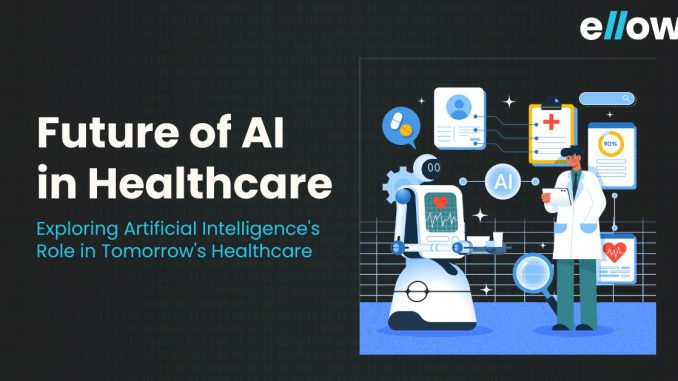
The intersection of artificial intelligence and healthcare is rapidly transforming from a speculative concept into a tangible reality, heralding an era of unprecedented advancements in diagnostics, treatment, drug discovery, and patient care. AI’s capacity to process, analyze, and derive insights from vast, complex datasets at speeds far beyond human capabilities is not merely augmenting medical professionals; it is fundamentally reshaping the entire healthcare ecosystem, promising a future that is more precise, efficient, and personalized.
One of the most immediate and impactful applications of AI in healthcare is in improving diagnosis and medical imaging. Radiologists, pathologists, and other specialists often face immense pressure to accurately interpret complex medical images like X-rays, MRIs, CT scans, and pathology slides. AI-powered algorithms, trained on millions of such images, can now detect subtle patterns, anomalies, and early signs of diseases that might be imperceptible or easily missed by the human eye. For instance, AI can assist in the early detection of cancerous lesions, identify diabetic retinopathy in retinal scans, or spot fractures in X-rays with remarkable accuracy. This doesn’t mean AI replaces the human expert; rather, it acts as an intelligent assistant, a tireless second opinion that flags potential concerns, reduces diagnostic errors, and allows clinicians to focus their expertise on the most complex or ambiguous cases, thereby improving patient outcomes and potentially saving lives.
Beyond diagnostics, AI is poised to revolutionize personalized medicine and treatment planning. Every patient is unique, with distinct genetic profiles, lifestyles, and responses to treatments. Traditional “one-size-fits-all” approaches often fall short. AI can analyze an individual’s comprehensive health data—including genetic information, electronic health records, wearable device data, and even social determinants of health—to create highly individualized treatment regimens. This could mean predicting a patient’s response to specific drugs, tailoring chemotherapy doses based on tumor characteristics, or developing preventative health plans that proactively address an individual’s risk factors for chronic diseases. For example, AI can identify signatures in an individual’s data highly predictive of developing conditions like Alzheimer’s, chronic obstructive pulmonary disease, or kidney disease years before symptoms appear, enabling early intervention and potentially delaying or preventing disease onset.
The traditional process of drug discovery and development is notoriously lengthy, expensive, and fraught with high failure rates. From initial target identification to clinical trials and regulatory approval, bringing a new drug to market can take over a decade and cost billions of dollars. AI is poised to dramatically accelerate this entire pipeline. By analyzing vast datasets of molecular structures, genetic information, and scientific literature, AI algorithms can identify potential drug candidates, predict their efficacy and toxicity, and simulate their interactions with biological systems with unprecedented speed. Generative AI, for instance, can even design novel molecules from scratch, dramatically reducing the time spent on traditional lab-based trial-and-error. This expedited discovery process holds the promise of faster development of new medications for previously untreatable diseases, significantly reducing the cost burden of pharmaceutical research.
AI is also making substantial inroads into operational efficiency and administrative tasks within healthcare systems. Healthcare professionals often spend a significant portion of their time on paperwork, scheduling, billing, and other administrative duties, diverting their focus from direct patient care. AI-powered tools can automate many of these routine tasks, from intelligent clinical coding that analyzes notes and assigns standardized codes, to optimizing appointment scheduling to reduce wait times and no-shows. AI-driven chatbots and virtual assistants can handle patient inquiries, provide appointment reminders, and offer preliminary health information, thereby improving patient engagement and alleviating the workload on human staff. This streamlining of workflows is crucial for combating physician burnout and making healthcare delivery more efficient and cost-effective.
However, the transformative potential of AI in healthcare is accompanied by critical ethical considerations and challenges. One primary concern is data privacy and security, given the highly sensitive nature of health information. AI systems rely on vast datasets, and robust safeguards are essential to protect patient confidentiality from breaches and misuse. Another critical issue is algorithmic bias. If AI models are trained on unrepresentative or biased datasets, they can perpetuate or even exacerbate existing health disparities, leading to unequal treatment or misdiagnoses for certain demographic groups. Ensuring fairness, transparency, and explainability in AI algorithms is paramount, especially when AI supports life-altering medical decisions. Furthermore, questions of accountability and liability arise: who is responsible when an AI system makes an error that leads to patient harm? Establishing clear regulatory frameworks and legal precedents is vital for building trust in AI-driven healthcare.
The future of AI in healthcare is not one where machines replace human caregivers entirely, but rather one where AI acts as a powerful augmentation. It will empower doctors, nurses, and researchers with superior tools for diagnosis, personalized treatment, and accelerated discovery, freeing them to focus on the uniquely human aspects of care: empathy, communication, and complex ethical judgment. The integration will require continuous upskilling and reskilling of the medical workforce, a commitment to ethical AI development, and robust regulatory oversight. As these challenges are addressed, AI stands poised to deliver a healthcare system that is more accessible, more equitable, and ultimately, far more effective in enhancing human well-being across the globe.